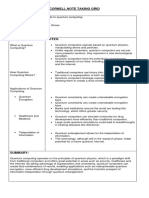0% found this document useful (0 votes)
27 views1 pageQuantum Computing and Future Technology
Quantum computing utilizes qubits to perform computations that classical computers cannot, enabling faster processing through superposition and entanglement. It has significant real-world applications in fields like cryptography and drug discovery, while global investment from companies and governments is increasing. However, challenges such as environmental sensitivity and the need for error correction remain to be addressed.
Uploaded by
Awan GraphicsCopyright
© © All Rights Reserved
We take content rights seriously. If you suspect this is your content, claim it here.
Available Formats
Download as PDF, TXT or read online on Scribd
0% found this document useful (0 votes)
27 views1 pageQuantum Computing and Future Technology
Quantum computing utilizes qubits to perform computations that classical computers cannot, enabling faster processing through superposition and entanglement. It has significant real-world applications in fields like cryptography and drug discovery, while global investment from companies and governments is increasing. However, challenges such as environmental sensitivity and the need for error correction remain to be addressed.
Uploaded by
Awan GraphicsCopyright
© © All Rights Reserved
We take content rights seriously. If you suspect this is your content, claim it here.
Available Formats
Download as PDF, TXT or read online on Scribd
/ 1








































































